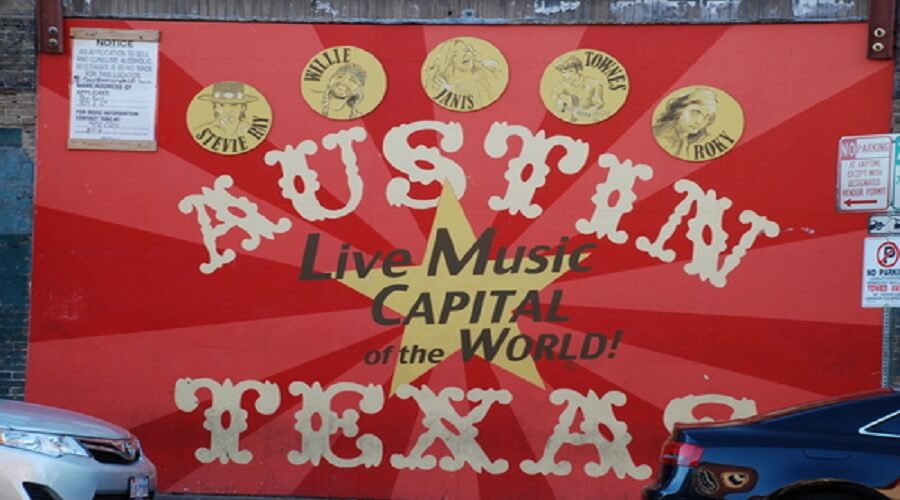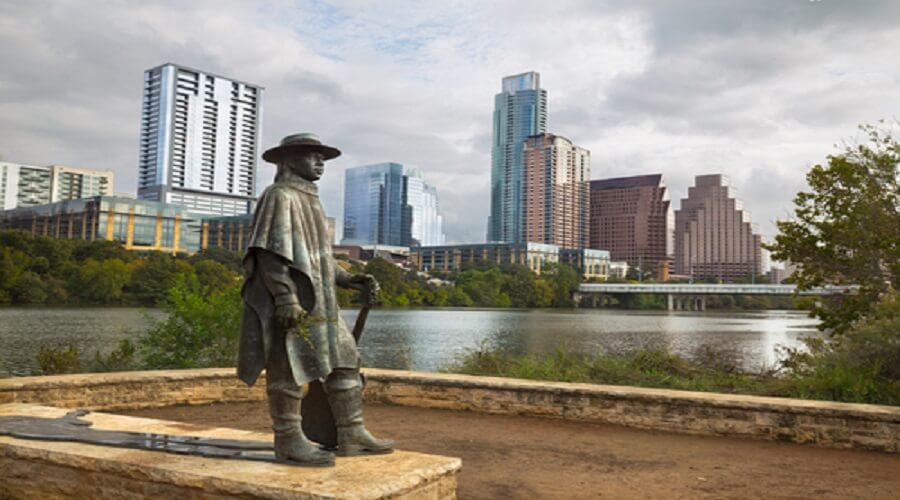In the 1960s, Tim Overton, an ex-college football player, became known as the Godfather, for controlling a gang of unsavory characters from the wrong side of town. Local musicians, lawyers, and politicians became inextricably linked to their illegal activity because they all had a penchant for the same pastimes.
The city’s criminal past, along with the ever-present Texas football culture, surprisingly led to Austin’s present-day musical paradise status, all converging in a way that wouldn’t happen anywhere else.
Golden Ticket
Tim Overton grew up poor on the east side of Austin. He was a successful athlete and a local champion at golden gloves and bare-knuckled fighting.
Like many small-town poor Texan boys, football became the way out of his family’s social ranking. He was also a smart kid, good at math, and he possessed a keen wit. Classmates remember him as a charismatic and popular student at Austin High School.
After graduating in 1958, Overton received a full football scholarship to the University of Texas. He also began to moonlight as a facilitator of illegal activities. His status as an untouchable college football star was compromised after the police made one too many visits to investigate his behavior. Head Coach Darrell Royal cut him from the team, and the university expelled him. Overton then concentrated his efforts on becoming a major player in the Austin criminal underworld.
Bank Robbers
Overton and his crew started by robbing small banks up and down the I-35 corridor, which runs north to south through the city of Austin. He went so far as to install a safe at his father’s auto transmission shop to practice his safecracking skills.
His new criminal career resulted in a stint at the Huntsville penitentiary, where Overton spent 1961 after being convicted of safecracking. Meanwhile, the illegal funds from the thefts continued to bankroll the gang’s criminal activity.
The group expanded their enterprise into prostitution, drugs, and petty theft. By 1963, Overton and his entourage of hoodlums settled into their roles as the rag-tag mafia of the seedy Austin underbelly.

Folk Music
By the mid-1960s, Austin bands began to play original music in bars like the Old New Orleans and Threadgill’s near the University of Texas campus. Threadgill’s had a long history of hosting live music since the Great Depression, but the former filling station-turned-bar became a haven for 60s folk singers, including the notable Janis Joplin. In fact, she perfected her brassy style while performing at Austin bars like Threadgill’s.
Overton and his gang of about 20 miscreants lived well on their ill-gotten gains. The criminals quickly became a multi-state operation while remaining firmly entrenched in their hometown. Primarily focused on bank robbery and prostitution, the group took advantage of their position to participate in any illegal opportunity to increase their cash flow. They became regular figures at a well-known South Austin brothel run by Hattie Valdes, which employed many of their wives and girlfriends.
The Blues
East Austin venues like Charlie’s Playhouse catered to college kids drawn to the blues performances of talented Texans. Owner Charlie Gildon reportedly always saved the best table in the house for Tim Overton and his gang.
Tim and his boys partied hard at the Playhouse between bank jobs, robbing 13 banks in Texas, Kansas, and Missouri in 1965. The burgeoning music industry thrived, partly due to his gang’s notorious patronage and fame.

Rock ‘n’ Roll
As the bar scene grew, more venues opened to host live music. The Vulcan Gas Company booked the best local blues and rock bands, like the 13th Floor Elevators. The band pioneered the psychedelic music craze of the era, playing shows under the influence while shaping the music scene in Austin and across the nation.
The band’s fanatical following, along with the high-visibility and patronage of Austin’s very own gangsters, added to the mystique and popularity of the city’s booming music scene. People frequented clubs like the Vulcan Gas and Le Lollypop, hoping that they might spot Overton’s crew. The crowds exiting at closing time could be volatile and unruly, and fights occurred regularly.
In 1968, it appeared the fun had finally ended for Tim Overton and his criminal enterprise when the Federal Government indicted Overton and 19 of his associates for conspiracy to rob more than a dozen banks. The trial lasted almost six months. The prosecution’s case ended with a dismal six convictions.
Fortunately, however, the end of the trial also resulted in the end of Overton’s reign of terror. After serving another short stint in prison, a rival gangster, Big Ted Jones, murdered him in 1972.
Rock and Country meet in Austin
Meanwhile, the music scene in Austin continued to grow. It became apparent that combining rock with country outlaw music helped establish a unique and popular local sound.
Seasoned from a hard stint in Nashville, Willie Nelson came to town a bit older and wiser than many on Austin’s music scene, and the town quickly embraced him. He shed his Music Row suit and short hair and assumed the laid-back Austin vibe. The red-headed stranger had an extensive body of recorded work, and he parlayed Austin’s music catalyst through his Nashville connections.
The Vulcan Gas Company, the scene of many raucous parties by the Overton gang, closed due to mismanagement, but it yielded a new spot that became an iconic part of the Austin music world, the Armadillo World Headquarters.
The Armadillo World Headquarters opened in 1970 in an old, neglected National Guard Armory building that had poor acoustics. Yet one historic performance left an indelible change on the music scene and set the course for Austin to become a musician’s paradise.
Music experts point to Willie Nelson’s 1972 performance at the Armadillo as the moment the modern Austin music scene blossomed into a national focus. The unique blend of music and cultural harmony captured the soul of Austin, and it took on a life of its own.
Austin City Limits
In 1974, the local PBS channel filmed the pilot for a live music series focusing on original Texas music. That pilot eventually led to the broadcast of Austin City Limits in 1976, the longest-running music program on American television.
Who would ever have guessed that such an odd, eclectic mix of gangsters, country singers, and rock & roll musicians could give birth to a city recognized as the Live Music Capital of the World? Still, to this day, Austin continues to make its imprint on music history on a national level.
About The Author: An article by Harry Parsons from Arcadia Publishing, the largest and most comprehensive publishers of local and regional books in the United States. Explore the history of crime in America with fascinating accounts of prison life and the stories behind some of the nation’s most notorious criminals.










